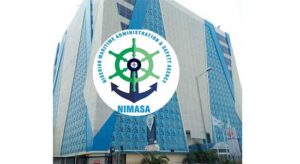Nigeria and other countries on the shores of the Gulf of Guinea lost $793.7m in 2016 as a result of maritime insecurity, the Nigerian Maritime Administration and Safety Agency has said.

The Director-General, NIMASA, Dr Bashir Jamoh, said this in a paper presentation titled ‘Enhancing collaboration amongst stakeholders for improved maritime security in Nigeria,’ at the Chief of Naval Staff Annual Conference in Kano State.
A statement issued by the agency also said there was a need for enhanced stakeholder collaboration in tackling maritime security challenges in Nigeria and the Gulf of Guinea.
Citing a report following the 9/11 attacks in the United States indicting security agencies for failing to share real-time intelligence, Jamoh urged Nigerian stakeholders to “learn to share their toys” in a bid to close the gaps and tighten the security ring around the nation’s maritime space against piracy.
“The economic cost of maritime insecurity is very pronounced for Nigeria compared to other countries. While the economic cost of piracy activity in Asia was estimated at $4.5m (as of 2016), the estimated economic cost of maritime insecurity in the GoG was about $793.7m,” he said.
He said sources through which insecurity led to loss of revenue in the maritime sector included ransom payment, insurance premiums, re-routing ships, security equipment, losses to oil and fishing industry, and cost of security escort.
Jamoh said, “Studies have identified the following factors as the drivers of maritime insecurity in the region.
“They include an increase in ship traffic as a result of globalisation; the debilitating leadership of many of the states in the region; the proliferation of small arms; poor monitoring and control of the oceans; and criminality, which have been further aggravated by visible youth unemployment.”
Read Also: MWUN Seeks Improved Security As Rivers Pirates Kidnap Five Boat Passengers
He said high levels of poverty and economic hardship were also listed as causative factors.
“The impacts of these challenges are far-reaching and require that all concerned should collaborate to tackle this menace,” he added.
Jamoh said some collaborative efforts by NIMASA to address maritime insecurity included the implementation of the Deep Blue project; the enactment of the Suppression of Piracy and other Maritime Offences Act 2019; and community engagements; among others.
The DG, who was honoured at the event by the Chief of Naval Staff, Vice Admiral Awwal Zubairu Gambo, for ensuring civil military cohesion, reiterated the need for interagency cooperation.
“Working together is, therefore, a most vital approach to defend our seas, enhance maritime security, promote trade, protect the environment, and guarantee the quality of life of our people,” he said.
Kindly like us on Facebook
















Discussion about this post